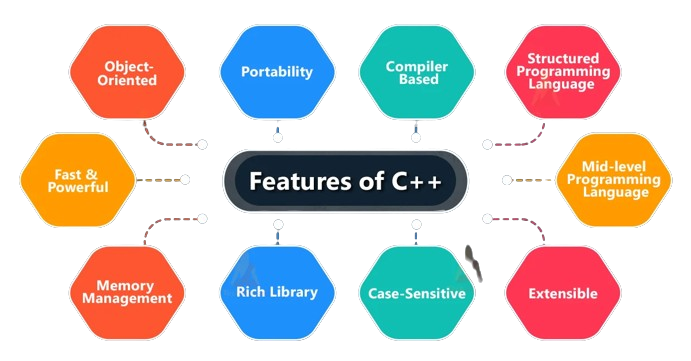C++ is a powerful and versatile programming language
with a rich history and many interesting facts. Here are
some intriguing facts about C++ language:
1. History and Development
-
Origin: C++ was developed by Bjarne Stroustrup
at Bell Labs in the early 1980s. It was initially
called "C with Classes" and was intended to enhance
the C language with object-oriented features.
-
Standardization: The first standardized version
of C++ was ratified in 1998 (ISO/IEC 14882:1998).
Since then, several major updates have been released,
including C++11, C++14, C++17, and C++20.
-
Influence: C++ has influenced many other
programming languages, including Java, C#, and even
newer languages like Rust.
2. Language Features
-
Object-Oriented Programming: C++ supports
object-oriented programming (OOP), which includes
concepts like classes, inheritance, polymorphism, and
encapsulation.
-
Templates: One of the powerful features of C++
is its template system, which allows for generic
programming. This enables developers to write code
that works with any data type.
-
Memory Management: C++ provides fine-grained
control over memory management. Developers can
allocate and deallocate memory manually using
operators like new and delete.
-
Standard Library: The C++ Standard Library
includes a rich set of functions and classes for data
structures (like vectors, lists, and maps),
algorithms, input/output, and more.
3. Performance and Usage
-
Performance: C++ is known for its high
performance. It provides low-level access to memory
and system resources, which is why it is often used in
system programming, game development, and real-time
applications.
-
Compatibility: C++ is largely backward
compatible with C, allowing C++ programs to use C
libraries. This compatibility has helped in the
widespread adoption of C++.
-
Cross-Platform: C++ is highly portable and can
be compiled on various platforms, including Windows,
Linux, macOS, and many embedded systems.
4. Applications and Industry Impact
-
Widely Used: C++ is used in a variety of
applications, including operating systems (e.g., parts
of Windows and macOS), game engines (e.g., Unreal
Engine), high-frequency trading platforms, and
scientific computing.
-
Compilers: There are several popular C++
compilers available, such as GCC (GNU Compiler
Collection), Clang, and Microsoft Visual C++.
-
Community and Support: C++ has a large and
active community. Numerous resources are available,
including books, online tutorials, forums, and
conferences like CppCon.
5. Unique Aspects
-
RAII (Resource Acquisition Is Initialization):
C++ uses the RAII idiom to manage resource allocation
and deallocation, which helps in preventing resource
leaks.
-
Multiple Inheritance: Unlike some other OOP
languages, C++ supports multiple inheritance, allowing
a class to inherit from more than one base class.
-
Operator Overloading: C++ allows operators to
be overloaded, enabling developers to define custom
behavior for operators (e.g., +, -, *) for their own
classes.
6. Fun Fact
Complexity: Despite its power and versatility,
C++ is known for its complexity. There’s a famous
saying: “C++ makes it harder to shoot yourself in the
foot, but when you do, it blows your whole leg off.”


